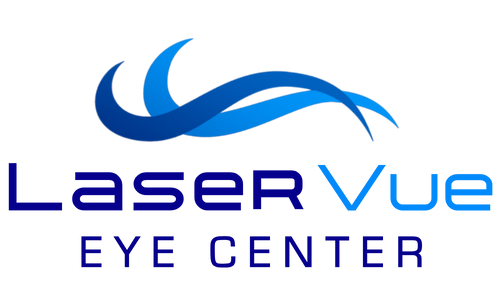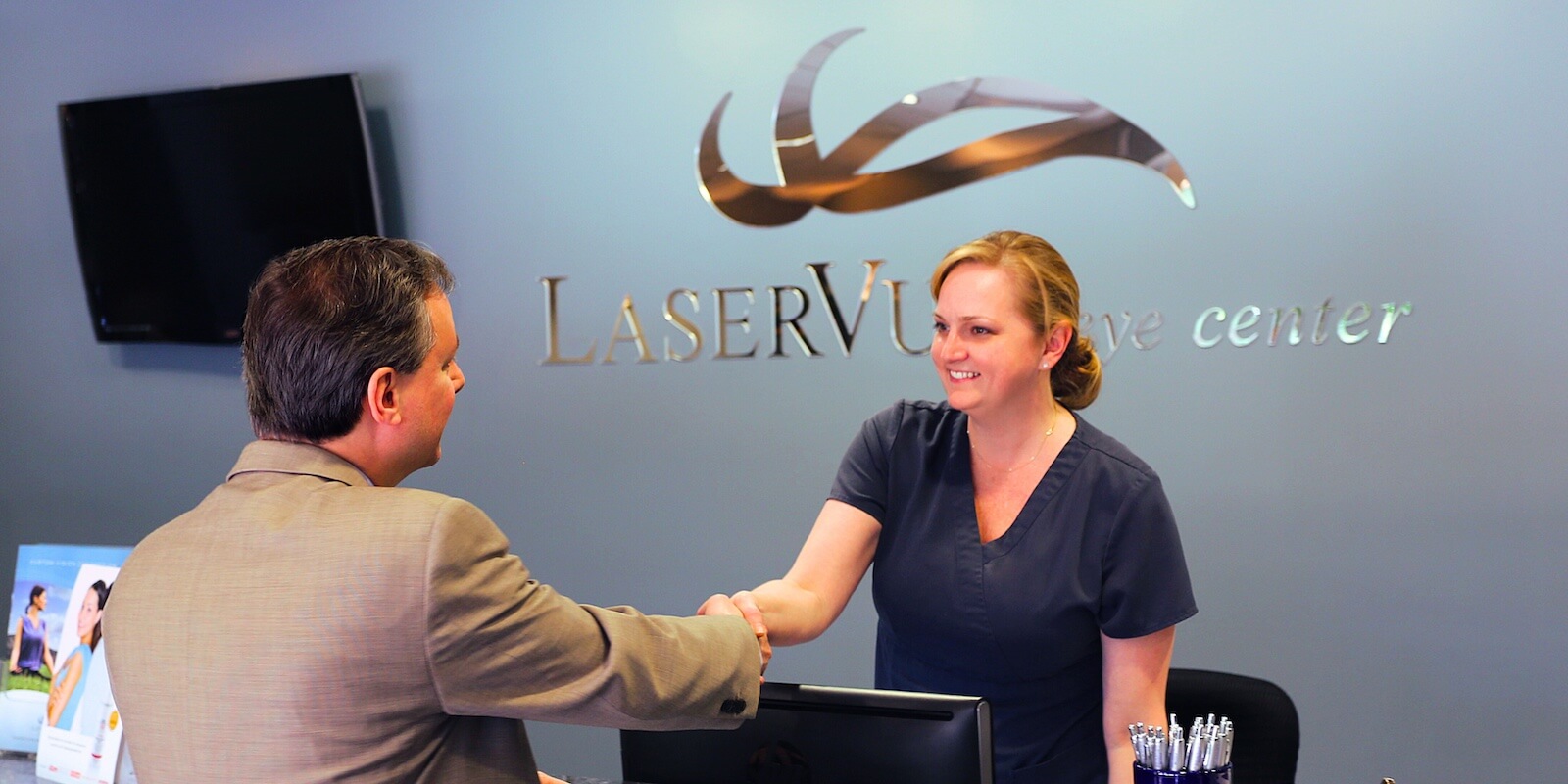Home » Services » LASIK » LASIK Eye Surgery FAQs
LASIK Eye Surgery FAQs
LASIK (Laser Assisted In Situ Keratomileusis) is a 15-minute laser vision correction procedure, which reduces dependence on corrective lenses or eliminates the need for corrective lenses altogether—depending on patient-specific variables. In the procedure, the surgeon lifts a tiny flap of tissue on the surface of the eye in order to reshape the underlying cornea through use of a computer-guided excimer laser. The surgeon then repositions the flap of tissue over the reshaped cornea. LASIK is a surgical procedure that is capable of correcting a wide range of nearsightedness (myopia), farsightedness (hyperopia), and astigmatism.
The excimer laser produces a high-energy, cold, ultraviolet light beam in pulses and delivers the pulses to a surface of the eye’s cornea. These pulses break the bond between molecules and tissue cells so that a controlled amount of tissue can literally be vaporized away to reshape the cornea—one microscopic layer at a time. The excimer laser is computer-controlled and programmed to custom treat each individual eye with a high degree of precision. For most cases, the thickness of the layer removed by the laser is less than the thickness of a human hair.
The goal of any refractive surgical procedure is to reduce or eliminate your dependence on corrective lenses-so that you may freely enjoy activities without the encumbrance of glasses or contacts. Our commitment to you is that we will not perform laser vision correction on you or anyone we feel does not have a good possibility of achieving independence from glasses and contacts. There are three main variables that will influence vision results: a thorough pre-operative evaluation to determine whether you are a good candidate for LASIK, the experience of your LASIK surgeon/team, and the equipment utilized. To ensure the best outcome, it is critical that you select your surgical team wisely. Honest evaluation, surgical experience, and state-of-the-art technology are crucial to the end result.
As with any surgery, there are risks. Fortunately, however, the risks are low and the patient satisfaction rate is high. The informed consent will outline the risks more thoroughly before you decide to have the procedure. Potential risks may include the following:
Halos – Some patients will notice glare, halos, or starburst around objects in low-light conditions. For the vast majority, these symptoms are temporary. However, others will continue to experience them for several months or longer. During your preoperative evaluation, we will determine whether or not you are at high risk for seeing long-term halos.
Dry eyes – There is increased dryness of the eyes typically for several months following LASIK, though some patients may experience dryness for a longer period of time. It is important to use lubricating drops frequently. If the eyes remain dry for a prolonged period, there are other drops or techniques that can help. Again, your preoperative evaluation will help determine whether or not you are a candidate for experiencing dry eyes.
Infection – This is an extremely rare occurrence, with a 1 in 2000-3000 chance (similar to any eye surgery). Fortunately, as the LASIK technique has developed over the years and proven to be of great benefit to millions of patients nationwide, firmly established protocols now exist that minimize the risk of infection dramatically.
The best way to determine if you are a candidate for LASIK is by an individual evaluation by our doctors. At that time we will verify whether you are a good candidate for LASIK and answer any questions you may have. We will encourage you to understand the procedure, the risks and benefits, and to harbor realistic expectations.
In general, a good LASIK candidate is at least 18 years old, has healthy corneas, and has maintained a stable eye prescription for the last 12 months. People with certain medical conditions or women who are pregnant or nursing may not be good candidates.
We believe that not everyone is a good candidate for LASIK eye surgery. When it comes to your eyes, being discriminating is appropriate. Only careful examination of your eyes and your individual case and needs will determine whether LASIK is right for you.
In laser vision correction, complications rarely occur. But, when they do, they are usually related to the surgeon’s experience and technique. Complications appear to be greatly reduced by the surgeon’s experience, training, and meticulous attention to detail. Error rates that are less than one percent with a skilled LASIK surgeon can rise rapidly in less experienced hands. LaserVue surgeons have helped train many LASIK surgeons and co-managing doctors through proctoring, lectures, and seminars. Additionally, Dr. Jay Bansal at LaserVue has designed several innovative LASIK instruments and a popular LASIK surgical nomogram. Because of our vast experience, hundreds of doctors, surgeons, and other healthcare workers have trusted their eyes to Dr. Bansal and Dr. Singh. We are routinely asked to provide second opinions for LASIK complications experienced by patients from other providers.
It is crucial to select your surgeon wisely. Our goal at LaserVue is to communicate clearly to our patients what they can expect during their laser experience and what their results are likely to be. We pledge to you, always, our honest evaluation and complete dedication.
No. Many of the discount LASIK centers want you to believe that LASIK should be purchased like a commodity, and that surgeon experience, laser and diagnostic technology, and follow-up care do not matter. Laser vision correction will affect the way you see for the rest of your life. You should make your decision to have laser vision carefully, not quickly. We encourage you to visit other laser centers and compare them to us. Our website provides detailed information about our surgeons, our laser technology, our advanced diagnostic technology, and what you should expect for the money you spend.
We perform LASIK on both eyes during the same day in the overwhelming majority of our patients. There are pros and cons to this approach, but most people would prefer to minimize any postoperative discomfort and time off from work.
The procedure is painless. Your eye is anesthetized with numbing eye drops. You will be awake and comfortable throughout the procedure. Most people experience four to six hours of mild irritation after their LASIK procedure and can return to work the next day.
No. Your eyes will look exactly the same.
Most normally sighted patients require readers in their mid-forties. This is caused by the normal weakening of the focusing muscles of the eye, known as presbyopia, which usually starts around the age of 40—45. This condition occurs with or without LASIK. Those patients who currently have bifocals will still need reading glasses after the surgery unless they opt for a treatment plan called monovision, wherein one eye is corrected for distance and the other for near vision.
If you are presbyopic, monovision is an option to help correct both your distance and near vision. The monovision procedure corrects the focus of one eye for distance vision and the other eye for near vision. Monovision is a compromise of both distance and near vision. Depth perception is also affected. For people with high visual demands, like sports or constant near work (i.e., reading), we recommend full distance correction with glasses for near vision. A trial period with contact lenses or glasses may help determine if monovision would be a good option for you.
The vision correction is permanent. However, your vision may change naturally with time and LASIK does not affect visual conditions that may develop with age. Also, LASIK does not prevent presbyopia and the eventual need for reading glasses. Depending on the cause, retreatment may be a viable solution to later vision changes, and other treatment options also exist.
Yes. We recommend you discontinue soft lens wear one week prior to your procedure, and a minimum of three to four weeks for soft toric/gas permeable lenses.
The cost of vision correction varies among practices, based on surgeon experience, technology, and what the center includes in the fee. We are not the least expensive provider. We have invested heavily in staff training and technology. Our advanced laser and diagnostic technology are second to none. This investment is extremely important to surgical results and our patients tell us they can see the difference. We encourage you to visit other laser centers and compare.
It’s only natural to want to get the best price, but remember: Quality, personal service, attention to detail, and results are extremely important when it comes to your eyes. Your vision is one of your most important assets.
LASIK is an elective procedure, which means that the surgery is optional. As a result, only a few insurance companies pay for all or part of vision correction procedures. You can check with your plan administrator, or we will be happy to make a copy of your insurance card and check coverage for you. In some cases, the fees can be covered by medical flex/cafeteria plans that allow pretax dollars to be set aside. Please ask your employer if they offer this type of benefit. Vision correction may also be tax deductible as a medical expense (check with your financial advisor). If you do not have insurance coverage, we do offer affordable payment plans. It is easy to apply online and receive credit approval before you schedule an appointment.
Eyes and vision are very precious. It is perfectly natural to be nervous about having the procedure. Much of this comes from fear of the unknown. Dr. Bansal and our staff spend a great deal of time describing exactly what’s involved in the procedure and what sounds and sights you will experience. We will “walk you through the process” to make you as comfortable as possible.
It’s always wise not to rush into something, especially when it comes to something as precious as your vision. We encourage you to bring friends or family members with you to your laser vision evaluation so that we can educate them, as well as you, and answer any questions they might have. We are very proud of our surgical techniques and state-of-the-art technology.
The majority of patients are able to drive themselves the next day after the procedure. The Department of Motor Vehicles usually grants unrestricted driving privileges to individuals who possess 20/40 or better vision. More than 90 percent of all patients who undergo LASIK surgery have this level of vision or better by the first day after their procedure. Please note, that one should not drive unless their vision is better than 20/40 and they are comfortable with their visual acuity.
Yes. It is normal to develop cataracts as one gets older and the cataract surgery procedure does not change. However, your lens implant will be calculated using a different formula. LaserVue surgeons have performed cataract surgery on many patients with previous laser vision correction.
Schedule a free LASIK evaluation, with no obligation. Call 1-800-527.3745 or request a free consultation today.
Other FAQs: Cataract FAQ
Take our LASIK Self-Test to see if LASIK might be a good option for you before visiting one of our 3 locations.

